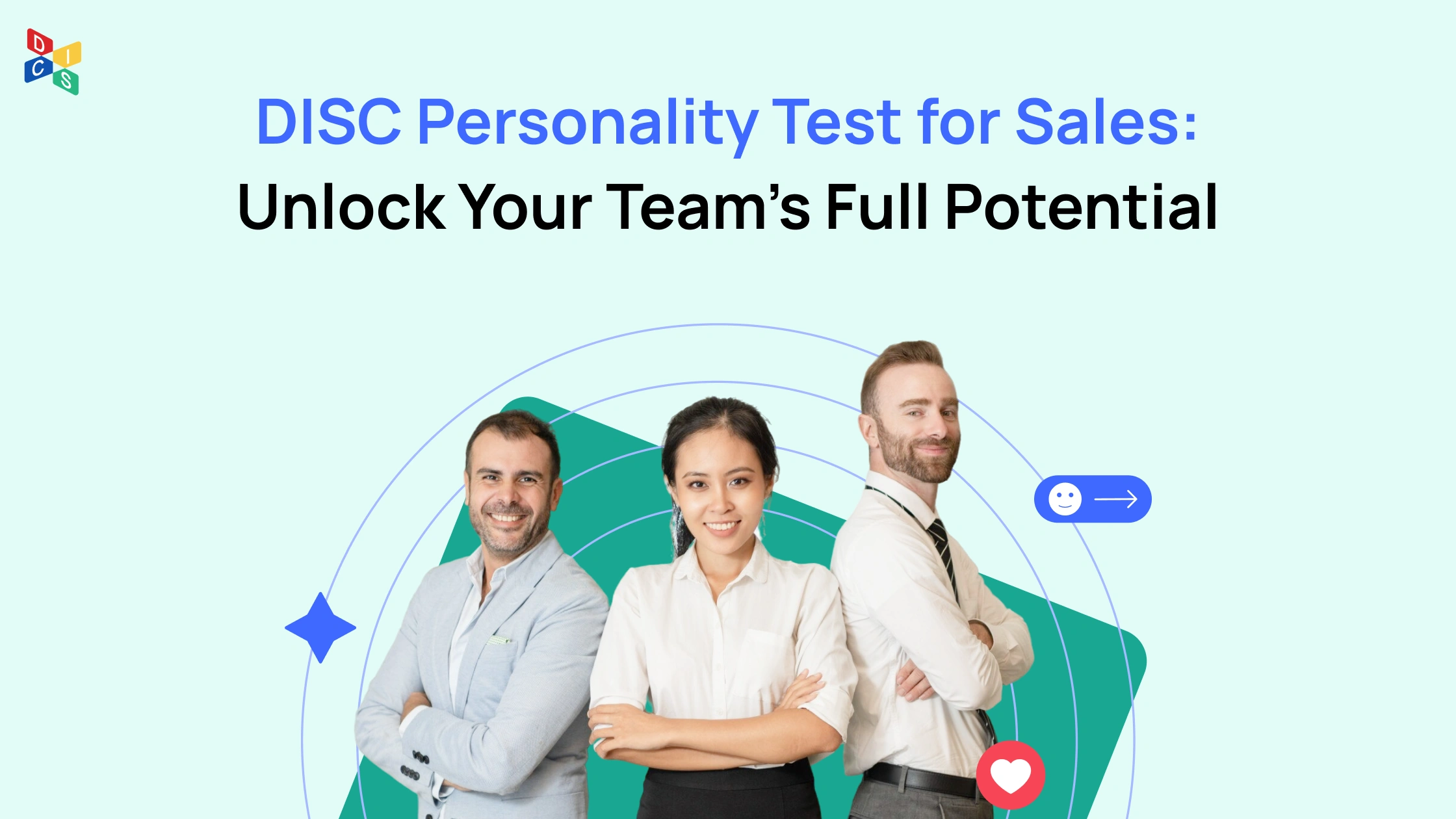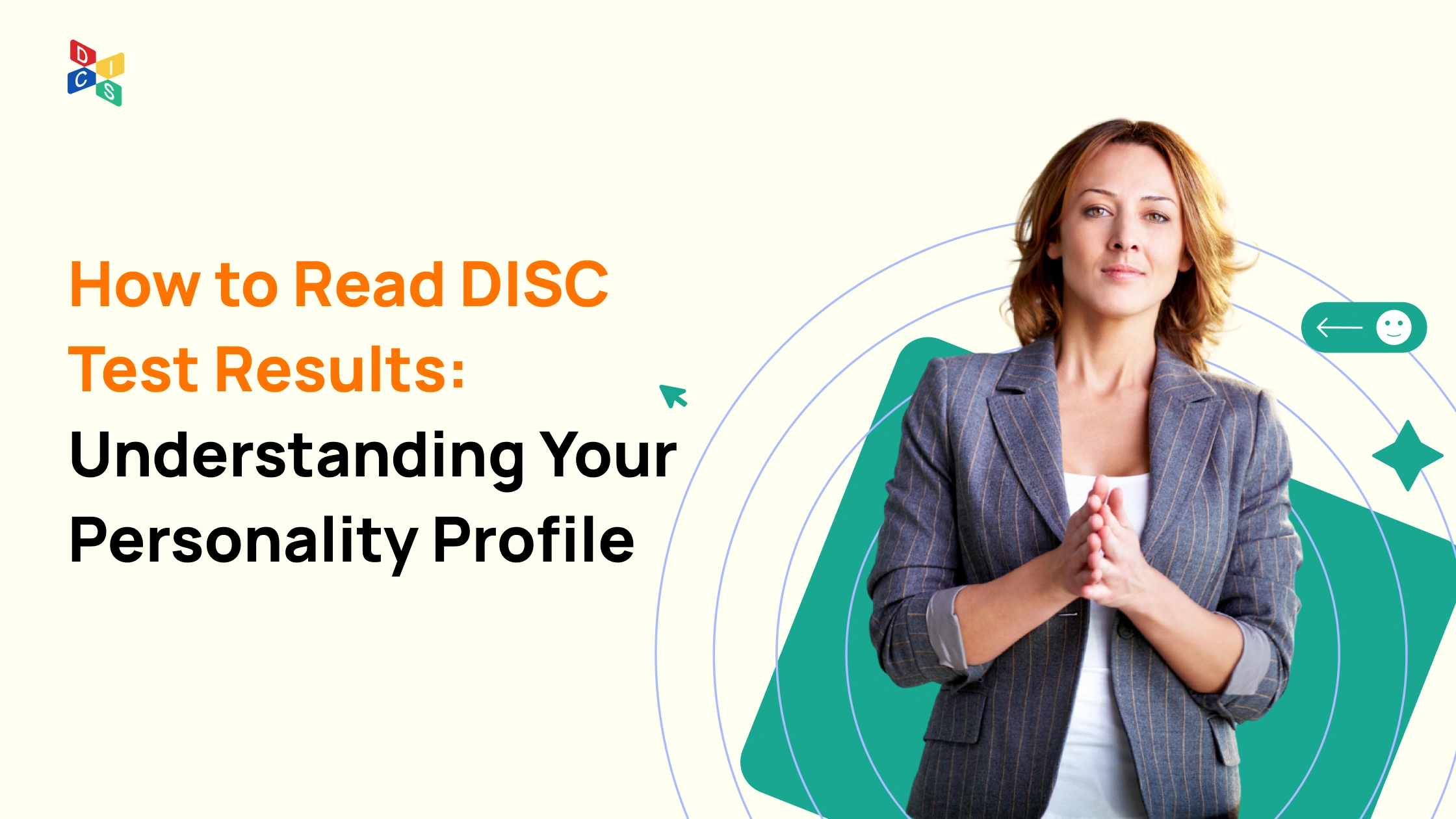Table of content
Understanding DISC Training Personality for Personal and Career Development
Explore what DISC training personality is, engaging activities to understand different personality styles, and how it benefits career development.
Understanding yourself and others is a powerful advantage in today’s workplace. DISC training personality programs provide a solid foundation to understand behavioral patterns, improve communication, and form stronger ties with others. It provides the knowledge and resources you need to reach your goals, whether they be improved teamwork, personal development, or more successful leadership.

What is DISC Personality Training?

The DISC model is used to construct a behavioral development method known as DISC personality training. The four main personality traits used to characterize human behavior are Dominance (D), Influence (I), Steadiness (S), and Conscientiousness (C). Each type offers a unique strategy for dealing with the outside world, covering everything from communication and decision-making to stress management and collaboration.
Read more: What Do The Letters in DiSC Stand For? Understanding the 4 DiSC Personality Types in 2025.
Unlike a simple assessment that merely reveals your profile, DISC training personality programs take a step further by guiding participants on applying these insights in real-world circumstances. For instance, a DISC training personality example could include a team workshop where each member learns how to approach tasks based on their strengths. This equips individuals with the knowledge and skills needed to:
- Recognize their primary DISC style: Become more aware of their tendencies and preferences.
- Detect other people's DISC styles: Develop the ability to detect and grasp distinct behavioral patterns.
- Change the way of communicating: Learn how to interact with people with diverse DISC styles more effectively.
- Recognize the value of diverse personality types: Foster a more cooperative and inclusive environment.
DISC Assessment vs. DISC Training
While often mentioned together, DISC assessment and DISC training personality programs serve different - but complementary - purposes.
Typically, the initial step is the DISC assessment. It is a diagnostic procedure that uses a series of questions to identify a person's primary behavioral type. The results provide a profile of the individual's communication preferences, stressors, strengths, and areas for improvement.

In contrast, DISC training personality is an educational and developmental process. It expands on the findings of the DISC training personality test, which are typically conducted in advance, but it goes much beyond them in terms of knowledge and talents. The interactive and real-world application of DISC concepts is stressed in DISC training personality. Workshops, group activities, role-playing, and coaching are examples of training programs designed to help teams and individuals understand how different personality types interact and how to adapt.
| Key characteristics | DISC assessment | DISC training |
| Focus | Identifying an individual's primary DISC style(s) | Developing understanding, skills, and the ability to apply DISC principles |
| Outcome | A personalized report outlining strengths, potential areas of improvement, and behavioral tendencies | Improved empathy, teamwork, communication skills, self-awareness, and the ability to change behavior |
| Format | Online questionnaire completed by the individual | Workshops, group activities, discussions, role-playing, and facilitated learning sessions |
| Purpose | Self-awareness, initial understanding of behavioral differences | Deeper understanding of self and others, practical application of DISC in communication, conflict resolution, and team dynamics |
| Time Commitment | Short time to complete the assessment and receive the report | Involves dedicated sessions or ongoing learning modules |
To put it simply:
- DISC evaluation determines your behavioral style.
- DISC personality training teaches you how to work and communicate with people from all points on the DISC spectrum, as well as why different styles exist and how they interact.
To try one yourself, check out The Comprehensive Test Deck - a great way to begin exploring your DISC type.
How DISC Training Personality Works: Techniques and Exercises
DISC training personality programs are designed to be participative and practical, putting theory into action. Instead of passively learning about personality types, participants engage in exercises that encourage introspection, dialogue, and teamwork. These practical ways help people understand and apply DISC concepts in real-world circumstances.

Activity 1: Self-Discovery Mapping
- Objective: Increase self-awareness and personal insight
- Benefit: Foundation for personal development and effective communication
This DISC training personality exercise focuses on enhancing self-awareness on an individual level. After receiving their free DISC test results, participants do a structured exercise to map their preferences and behaviors onto the DISC framework. These are some of the steps involved in this self-discovery process:
- Finding Key Descriptors: Reviewing lists of adjectives connected to each DISC style and selecting those that best reflect their preferences.
- Behavioral Anchors: Examining and categorizing earlier actions based on the DISC dimensions. For example, a time they took charge (Dominance), persuaded a team member (Influence), provided consistent support (Steadiness), or focused on precision (Conscientiousness).
- Finding their Strengths and Development Areas: Investigating how their dominant DISC style supports their strengths and identifying potential areas where knowledge of other styles could improve their effectiveness.
Activity 2: Team Dynamics Role Play
- Objective: Understand different DISC types in action
- Benefit: Improved collaboration and adaptability
This dynamic exercise in DISC training personality brings the interaction of different DISC styles to life. Participants are divided into smaller groups and assigned tasks that correlate to different DISC types in a specific work context (for example, a brainstorming session, a project kickoff meeting, or a decision-making process). Here are the steps typically followed during this role play:
- Scenario Briefing: The scenario and the usual behavioral traits of each group's assigned DISC style are outlined.
- Role-playing: Players act out the issue in their allocated styles.
- Observation and Debriefing: After the role-play, the group discusses what they witnessed, including how different ways handled the scenario differently, potential places of conflict or collaboration, and strategies for future, more successful teamwork.
Activity 3: Behavior Guessing Game

- Objective: Develop the ability to identify DISC traits in others
- Benefit: Builds stronger interpersonal awareness and team connection
This engaging DISC training personality practice helps participants improve their ability to identify different DISC styles in others. Here's how this game typically unfolds:
- Behavioral Scenarios: Without defining the DISC type, the facilitator provides brief descriptions of various behaviors or communication styles.
- Style Identification: Individuals or small groups of participants make accurate judgments regarding the prevailing DISC style most likely to exhibit that behavior.
- Discussion and Justification: After the participants have presented their arguments, the facilitator leads a discussion regarding the small distinctions between each style and the telltale signals that distinguish them.
Activity 4: Conflict Resolution Workshop
- Objective: Address challenges in workplace relationships
- Benefit: Reduced tension, stronger relationships, and a more cohesive team culture
This crucial DISC Training personality module focuses on applying DISC concepts to better navigate and resolve conflicts. Participants in this workshop often go through the following stages:
- Understanding Style-Based Conflict Triggers: Participants learn how various DISC styles may view and respond to conflict. A high-Dominance person might, for instance, be straightforward and forceful, whereas a high-Steadiness person might shy away from conflict.
- Creating Style-Specific Conflict Resolution Techniques: The program looks at customized methods for settling disputes with people who have distinct DISC styles. This could entail modifying communication methods, comprehending underlying motives, and identifying areas of agreement based on their priorities.
- Scenario Analysis and Practice: Through role-playing or group discussions, participants examine conflict scenarios involving various DISC styles and get experience using suitable resolution approaches.
To make the understanding of DISC training personality more engaging, examples can be drawn from popular culture, such as exploring the DISC personality traits of the Symbiote family.
Benefits of DISC Training Personality for Individuals and Teams
What truly distinguishes DISC training personality programs is their ability to affect group dynamics and individual behavior. DISC improves communication, teamwork, and leadership by developing a shared lexicon for personality types.

Strengthened Emotional Intelligence
DISC training personality directly contributes to enhanced emotional intelligence. People gain self-awareness and empathy as they learn to identify and comprehend the many DISC styles. They become more sensitive to their own and others' emotional reactions, resulting in more thoughtful and constructive social interactions. This comprehension allows them to
- Better manage their own emotions.
- Recognize and respond to other people's sentiments.
- Make firmer connections.
Enhanced Communication Skills
One of the most obvious benefits of DISC personality training is a significant improvement in communication skills. Participants acquire knowledge of:
- Determine how the various DISC types prefer to communicate.
- Change their method of speech.
- Reduce misunderstandings.
- Increase your persuasiveness.
More Effective Team Collaboration
A significant motivation for improving teamwork is DISC personality training. When team members are aware of one another's DISC types, they may appreciate each other's distinct talents and perspectives, as well as their respective strengths.
- Identify and anticipate potential points of dispute.
- Assign duties and responsibilities in a way that maximizes each individual's innate skills.
- Create a more inviting and encouraging atmosphere.
- Take advantage of multiple techniques for problem-solving and overcoming hurdles.
Tailored Leadership Development
DISC training teaches managers and leaders how to motivate, delegate, and handle issues based on the behavioral profiles of their team members. Leaders who understand DISC principles can:
- Recognize their leadership style.
- Modify their leadership style to meet team members’ demands.
- Build a stronger bond with their team.
- Support and encourage different groups.
- Effectively resolve conflicts within their teams.
Use DISC Training Personality in the Workplace
When DISC training personality is utilized in the workplace, it is possible to quantify performance, culture, and employee satisfaction. It provides a framework for organizations to understand behavior, promoting better leadership development, conflict resolution, and decision-making.

Here are some real-world examples of how firms might implement DISC training personality into their daily operations:
- Assist new hires: Help new hires understand their unique behavioral style and how to work with other team members from the start.
- Teambuilding Workshops: DISC exercises can help departments or project teams achieve alignment, mutual regard, and trust.
- Leadership Development Programs: Show managers how to alter their leadership style based on their team members' DISC profiles.
- Conflict Resolution: Use empathy and effective communication to reduce stress and improve outcomes.
- Performance Reviews: Use DISC findings to tailor remarks and excite employees in ways that are appropriate for their personalities.
Integrating DISC training personality into the workplace culture allows teams to cooperate more efficiently, communicate more clearly, and support each other's development.
Build a Better Workplace with DISC
Understanding behavior creates the framework for better cooperation, stronger connections, and more effective leadership in both personal and professional settings. DISC training personality programs provide insight and practical skills for personal growth, empathy, and communication.
Whether the goal is to improve team performance, resolve conflicts, or simply learn more about oneself and others, DISC training provides long-term benefits. Learning to recognize and accommodate different personality types can help individuals and organizations create more enjoyable and productive work environments.
If you’re still exploring different ways to get started, this roundup of Free Personality Tests - Top 4 Famous Online Test To Explore can help you discover the best fit for your learning style.
FAQs
Can DISC training personality be used for leadership development?
Yes. DISC training personality programs help with leadership development significantly. They help leaders understand their management style, identify the needs of a diverse workforce, and tailor their approach to better inspire and lead. Developing behavioral flexibility allows leaders to encourage more involvement and increase team effectiveness.
How can DISC training personality benefit me personally?
DISC personality training will help you better understand your communication style, emotional triggers, and strengths. It enables you to negotiate social and professional interactions more successfully, respond more cautiously under pressure, and form healthier relationships.
Is DISC training personality suitable for all industries and roles?
Of course. From entry-level employees to executives, DISC training personality is applicable to all roles and industries. It is frequently used to improve teamwork, communication, and employee engagement in a variety of sectors, including corporate, education, healthcare, customer service, technology, and even nonprofit organizations.
Are DISC assessments and training scientifically valid?
Based on behavioral theory, the DISC model has been widely used for many years. Although DISC is not a clinical psychological instrument, many of its training programs and evaluations are built on research-supported frameworks that have been proven to increase team and leadership development.
Is DISC training personality suitable for remote or hybrid teams?
Yes, and it's especially effective in remote work environments. DISC personality training helps remote and hybrid teams create empathy, improve digital communication, and understand how different personalities function in virtual situations. Nowadays, many programs are designed specifically for online delivery, utilizing breakout sessions, digital tools, and video conferencing.


Don't Let Your Potential Stay Hidden!
Take the DISC test today and discover your unique 'YOU', with deep insights into your true personality and potential.

Represents your instinctive behaviors and desires.
Shows the behavioral tendencies you think you should exhibit in specific situations.
Related articles
You may also be interested in
 DISCJan 06, 2026
DISCJan 06, 2026DISC Personality Test for Sales: Unlock Your Team’s Full Potential
DISC Personality Test for Sales helps sales teams improve role fit and performance. Learn how DISC boosts hiring, coaching, and customer alignment.
 DISCJan 06, 2026
DISCJan 06, 2026How to Read DISC Test Results: Understanding Your Personality Profile
Learn how to read DISC test results and understand your personality profile. Discover how DISC can enhance communication, teamwork, and career growth.
 DISCDec 31, 2025
DISCDec 31, 2025What Is Group Culture? How Team Behaviors Shape Workplace Success
Discover what is group culture and how it shapes team dynamics, decision-making, and performance. Learn how the DISC model can help improve your team’s culture.
